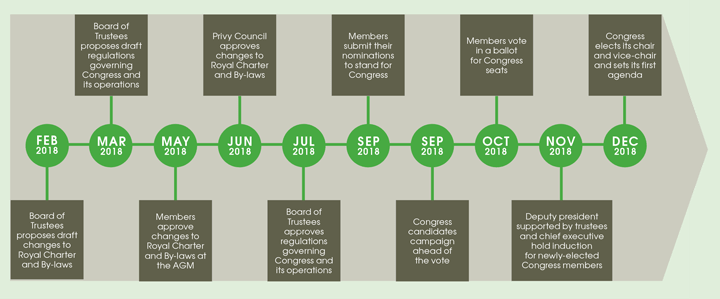Your Congress

Putting your votes into action
WHEN I stood as a trustee in April, I was intrigued and excited by IChemE’s plans to reform governance and reinvigorate member engagement. The idea of a member advisory body coupled with the push for members to nominate themselves as trustees, represented some of the biggest changes the Institution has made to governance in a generation.
Subsequently, at the Annual General Meeting in May more than 90% of members who turned out to vote on the new Royal Charter and By-laws approved the establishment of a Congress. Furthermore, my fellow trustees and I were delighted to hear in June that Her Majesty the Queen had confirmed the approval of these amendments. This was a real milestone for the Institution. Finally, we could get to work on establishing a representative body to channel the voice of our Institution’s membership.
Members far and wide were asked to stand. In fact, you may remember an article in the September issue of The Chemical Engineer from my colleague Mark Sutton, urging the membership to engage with Congress.
We welcomed 50 nominations, and after a two-week campaigning period and two weeks of voting, we announced the 32 volunteers who would take up seats on the inaugural Congress.
Members spanned the length and breadth of our membership, with representation for student members, right through to Fellows. This is what makes Congress so special; it provides every member, regardless of grade or location, with a pathway to make their voice heard, thereby ensuring that the direction of the Institution is informed by the views of the membership.
Nominees took the elections seriously, and important issues were hotly debated by candidates on our member-only forum, Interface. This is exactly the kind of constructive debate that we need to continue with Congress. I have been an advocate of this development and welcomed my appointment as Congress trustee lead. Congress is an integral part of the bigger picture that IChemE is working towards. A member-advisory body, along with the Board of Trustees responsible for delivering our charitable objectives, will ensure that we are truly led by members, supporting members, and serving society.
Being the voice, making a difference
This has been an exciting, yet challenging, time. We need to build on the momentum of change and enthusiasm of members. Like with any great idea, the disappointment of not living up to expectations can be very bitter. With the best will in the world, it won’t be perfect. We must look to the horizon and how Congress can contribute to the Institution for years to come. Now it is time to get it off the ground, work with newly-elected Congress members, feed back and improve.
For the first time in the history of our Institution, all members, including those who would not be able to vote at an EGM or an AGM, were invited to vote on a matter that places members’ priorities and expertise at the heart of everything IChemE does.
More than 35,000 members worldwide were invited to vote in Congress elections. The overall turnout was 6.5% but it varied vastly between categories of membership and geographies. For example, 18.2% of Fellows cast their vote for their regional and functional representatives, with only 3% of student members (one of the membership categories that cannot vote at General Meetings) taking part. Why, you ask? You will be pleased to know that these are exactly the type of issues that Congress is already touching upon even in its very early days.
Following an induction in November, Congress is now picking up at speed, and deliberations are already taking place on a new SharePoint platform delivered by IChemE. This platform, exclusively for Congress members, allows them to contribute to Congress business wherever they are based (time zones span from GMT-5 to GMT+13) and at their convenience – on the go, at home or at work.
Three members of Congress put their hats in the ring to be Congress chair. The elections were held on the SharePoint platform based on a single transferrable vote. On 5 December we announced that Nigel Hirst was elected as chair of inaugural Congress and Jane Cutler as vice chair as the runner up.
These members believe in the idea behind Congress as a vehicle to deliver greater engagement across the Institution, and are willing to put their name on it. However, every member of this inaugural Congress will play a vital role in defining the identity of the advisory body.
The Board of Trustees has already submitted agenda items for consideration and, now that a chair and vice chair have been elected, the agenda for the inaugural session of Congress can be set. Congress sessions will take place online, due to its international nature and may last up to 30 days. An annual face-to-face meeting will help Congress members to work as a true team.
The current regulations, role description for Congress members, and terms of reference provide Congress a direction and a starting point for a new mechanism that no doubt will make a difference for our Institution. The election of a chair and vice chair now means that Congress can manage its own business and can change the rules that govern its operations and setup. This means that Congress is dynamic by design. Thus, the Institution will continue to learn and evolve.
Congress is not a buffer between the membership and the trustees but a sounding board, a new set of eyes and a trusted advisor providing constructive proposals tested in a debate amongst a diverse group of members. Each functional and regional Congress member gives you a simple and direct way to be part of the membership voice.

Recent Editions
Catch up on the latest news, views and jobs from The Chemical Engineer. Below are the four latest issues. View a wider selection of the archive from within the Magazine section of this site.




